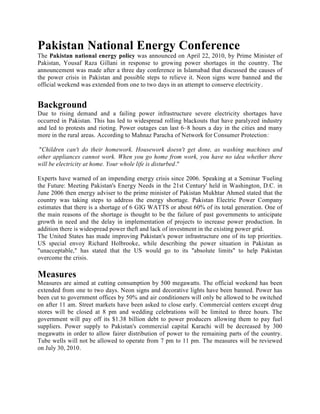Melden
Teilen

Empfohlen
Empfohlen
Weitere ähnliche Inhalte
Empfohlen
Empfohlen (20)
Product Design Trends in 2024 | Teenage Engineerings

Product Design Trends in 2024 | Teenage Engineerings
How Race, Age and Gender Shape Attitudes Towards Mental Health

How Race, Age and Gender Shape Attitudes Towards Mental Health
AI Trends in Creative Operations 2024 by Artwork Flow.pdf

AI Trends in Creative Operations 2024 by Artwork Flow.pdf
Content Methodology: A Best Practices Report (Webinar)

Content Methodology: A Best Practices Report (Webinar)
How to Prepare For a Successful Job Search for 2024

How to Prepare For a Successful Job Search for 2024
Social Media Marketing Trends 2024 // The Global Indie Insights

Social Media Marketing Trends 2024 // The Global Indie Insights
Trends In Paid Search: Navigating The Digital Landscape In 2024

Trends In Paid Search: Navigating The Digital Landscape In 2024
5 Public speaking tips from TED - Visualized summary

5 Public speaking tips from TED - Visualized summary
Google's Just Not That Into You: Understanding Core Updates & Search Intent

Google's Just Not That Into You: Understanding Core Updates & Search Intent
The six step guide to practical project management

The six step guide to practical project management
Beginners Guide to TikTok for Search - Rachel Pearson - We are Tilt __ Bright...

Beginners Guide to TikTok for Search - Rachel Pearson - We are Tilt __ Bright...
Pakistan National Energy Conference
- 1. Pakistan National Energy Conference The Pakistan national energy policy was announced on April 22, 2010, by Prime Minister of Pakistan, Yousaf Raza Gillani in response to growing power shortages in the country. The announcement was made after a three day conference in Islamabad that discussed the causes of the power crisis in Pakistan and possible steps to relieve it. Neon signs were banned and the official weekend was extended from one to two days in an attempt to conserve electricity. Background Due to rising demand and a failing power infrastructure severe electricity shortages have occurred in Pakistan. This has led to widespread rolling blackouts that have paralyzed industry and led to protests and rioting. Power outages can last 6–8 hours a day in the cities and many more in the rural areas. According to Mahnaz Paracha of Network for Consumer Protection: "Children can't do their homework. Housework doesn't get done, as washing machines and other appliances cannot work. When you go home from work, you have no idea whether there will be electricity at home. Your whole life is disturbed." Experts have warned of an impending energy crisis since 2006. Speaking at a Seminar 'Fueling the Future: Meeting Pakistan's Energy Needs in the 21st Century' held in Washington, D.C. in June 2006 then energy adviser to the prime minister of Pakistan Mukhtar Ahmed stated that the country was taking steps to address the energy shortage. Pakistan Electric Power Company estimates that there is a shortage of 6 GIG WATTS or about 60% of its total generation. One of the main reasons of the shortage is thought to be the failure of past governments to anticipate growth in need and the delay in implementation of projects to increase power production. In addition there is widespread power theft and lack of investment in the existing power grid. The United States has made improving Pakistan's power infrastructure one of its top priorities. US special envoy Richard Holbrooke, while describing the power situation in Pakistan as "unacceptable," has stated that the US would go to its "absolute limits" to help Pakistan overcome the crisis. Measures Measures are aimed at cutting consumption by 500 megawatts. The official weekend has been extended from one to two days. Neon signs and decorative lights have been banned. Power has been cut to government offices by 50% and air conditioners will only be allowed to be switched on after 11 am. Street markets have been asked to close early. Commercial centers except drug stores will be closed at 8 pm and wedding celebrations will be limited to three hours. The government will pay off its $1.38 billion debt to power producers allowing them to pay fuel suppliers. Power supply to Pakistan's commercial capital Karachi will be decreased by 300 megawatts in order to allow fairer distribution of power to the remaining parts of the country. Tube wells will not be allowed to operate from 7 pm to 11 pm. The measures will be reviewed on July 30, 2010.
- 2. Response In the days following the announcement, traders in Lahore rejected the government's decision and kept the markets open after 8 pm in defiance of the ban. Shops were kept open in other cities also after 8 pm. Kashif Shabbir, president of the Rawalpindi Chamber of Commerce warned the situation would get worse if authorities used force to implement the decision. There was confusion over implementation of the two day weekend, and many banks and educational institutions remained open. Commenting on the defiant mood of the traders, an editorial in Daily Dawn urged everybody to find middle ground. Reacting to the decision to curtail power supply to Karachi, the "City of Lights", leaders of various political parties in the Provincial Assembly of Sindh condemned the decision and some of them called it "a conspiracy to create a law and order situation." Former Nazim of Karachi, Naimatullah Khan warned that curtailing the power supply of the city could lead to street battles between protesters and law enforcement. Some analysts have predicted that reduction in the banks' workweek to 5 days will result in revenue losses.
